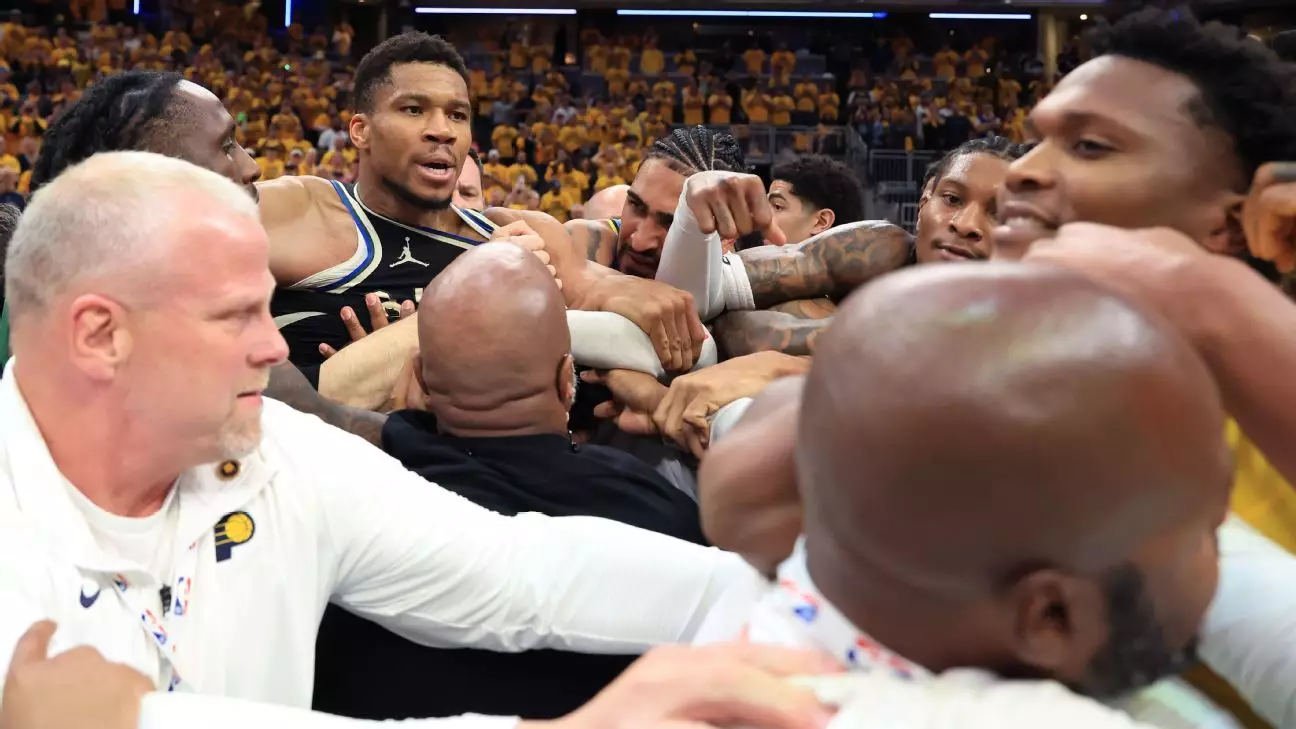In the world of professional basketball, emotions can simmer just below the surface, ready to erupt at any moment—and such was the case during an intense playoff face-off between the Milwaukee Bucks and Indiana Pacers. Following an exhilarating Game 5, which saw the Pacers clinch a narrow 119-118 victory, the mood turned sour when Giannis Antetokounmpo, the Bucks’ star power forward, found himself embroiled in a highly publicized altercation with Tyrese Haliburton’s father, John Haliburton. This post-game drama has shed light on the sometimes unmanageable intersection of sportsmanship, passion, and familial pride.
The Emotional Heart of Competition
At the heart of this conflict was a moment that encapsulated the highs and lows of competitive sports. As the Pacers celebrated their remarkable comeback, which included a last-second game-winning layup by Tyrese Haliburton, tensions flared. Antetokounmpo, having just concluded an outstanding performance—boasting a triple-double of 30 points, 20 rebounds, and 13 assists—went home empty-handed. Yet, it wasn’t his on-court performance that caught headlines; it was the unsanctioned antics of a proud father that ignited a fiery confrontation.
The Bucks’ forward expressed his distaste for John Haliburton’s actions, labeling them disrespectful. According to Giannis, John approached him, waving a towel adorned with his son’s likeness while hurling expletives. In a sport often defined by its competitive spirit, Antetokounmpo’s call for humility in victory—a refreshing take on post-game decorum—offers valuable insight into the values that athletes should uphold, even amidst triumphant chaos. Sportsmanship should serve as a guiding principle, transcending individual accomplishments and familial victories.
The Ripple Effects of Passionate Fans
However, not all the blame can rest on John Haliburton. The adrenaline associated with high-stakes competition often sweeps fans into frenzies of excitement, compelling them to act in ways they later regret. Tyrese himself noted this aspect when he commented on his father’s behavior, acknowledging that he had acted out of sheer elation. “Basketball is basketball, and let’s keep it on the court,” he stated, highlighting that although emotions run high, there are lines that shouldn’t be crossed.
Antetokounmpo’s subsequent remarks illustrate the gravity of the situation. Following the confrontation, he made it known that he desires mutual respect on the court, irrespective of a game’s outcome. Emphasizing that losing should not warrant disrespect towards others is a vital message for both players and their families. After all, a player’s journey is not just about their performance; it encompasses the broader ethos of respect and camaraderie that should resonate throughout the sport.
A Lesson in Accountability
The situation escalated further when John Haliburton later expressed his remorse over social media, addressing not only Giannis but also the organizations involved. His public apology serves as a reminder that accountability should be a cornerstone of sports, reminding fans and relatives alike of the implications their actions can have on the broader narrative of a game’s legacy. It’s a movement towards fostering an environment that celebrates not just victories, but the integrity that comes with them.
Post-game tensions weren’t limited to John Haliburton. Giannis found himself involved in another exchange, this time with Pacers guard Bennedict Mathurin, which underscores how relentless competition can provoke emotional responses. The phrase “war of words” aptly describes the escalating conflicts that sometimes accompany sporting events, drawing attention not only to the rivalries on the scoreboard but also to the more personal, human elements at play.
Defining Sportsmanship in High-Stakes Environments
The incident opens the door to a larger conversation about the dynamics of competition in high-stakes games. Is it possible to maintain sportsmanship amidst fervent rivalries? Are emotional explosions an inevitable consequence of intense competition? Giannis Antetokounmpo’s stance against verbal skirmishes is commendable, and it reflects a growing sentiment among athletes that the essence of sports should be preserved through respect.
What emerged from this dramatic turn of events is a spotlight on the cultural aspects of basketball—an exploration of how familial ties can influence player performances and public perceptions. As the NBA continues to shape the lives of its players and their families, incidents like these turn into crucial lessons about personal and collective responsibility, urging everyone involved to remember that respect transcends both victories and defeats.


Leave a Reply